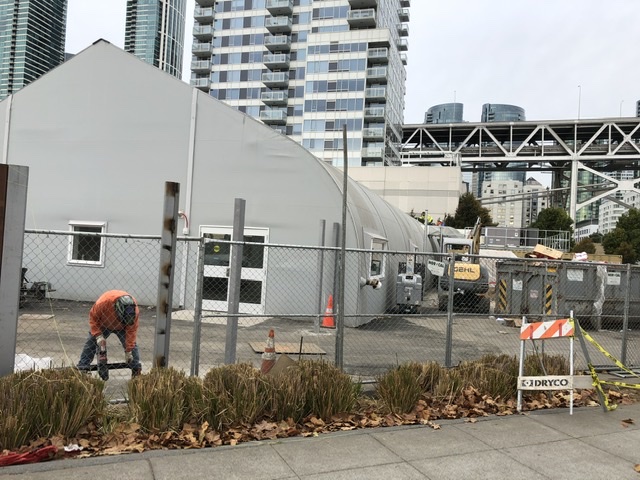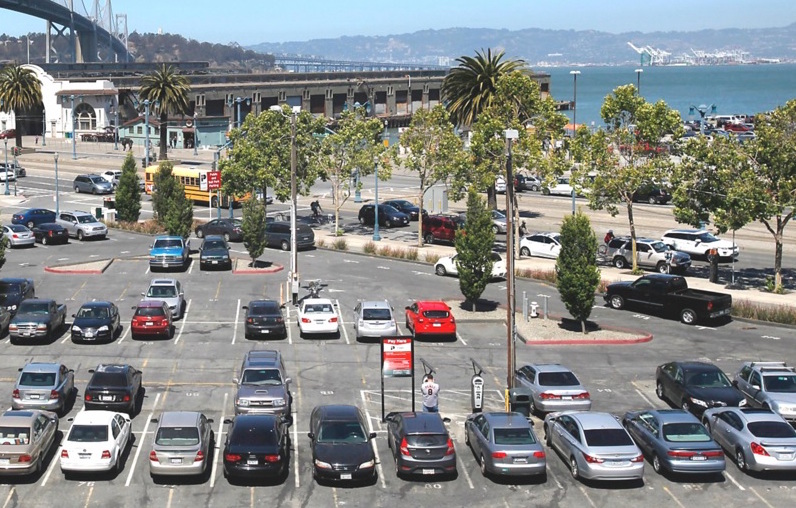A San Francisco County Superior Court judge denied what appears to be the last remaining claim in a lawsuit challenging construction of a fiercely contested multiservice homeless shelter on the Embarcadero.
Judge Blocks Navigation Center Opponents (Again), Letting Construction Continue

The decision, announced Monday, clears the way for the 200-bed navigation center, on the 2.3-acre South Beach lot in the shadow of the Bay Bridge, where homeless residents will be able to receive round-the-clock supportive housing and rehabilitative services. The city broke ground on the project in August and has already erected multiple temporary buildings on the site, located at the end of Bryant Street. It hopes to open the shelter by the end of the year, the mayor’s office said.
“With these legal challenges put to rest, we can focus on what really matters — helping people get off the streets and into shelter and care,” Mayor London Breed said in a statement. “I’m committed to continuing on our progress so that we can open 1,000 new shelter beds by the end of next year.”
Since March, when Breed first proposed the facility, the project has faced intense pushback from a group of local residents who claim it will bring blight and crime to the tourist-heavy neighborhood and cause property values to plummet.
The group, Safe Embarcadero for All, appealed unsuccessfully to the Board of Supervisors to block the project, and then sued the city, alleging it had failed to get the necessary approvals from the state and had not conducted the appropriate public outreach and environmental review. The group also argued that crime in the neighborhood had increased since the project began moving forward.

In September, Superior Court Judge Ethan Schulman denied the group’s request for a stay and temporary restraining order. He did, however, leave open the possibility that the city had failed to get the necessary approval from the state. Safe Embarcadero for All had “shown a likelihood of prevailing on the merits of one of its claims,” he wrote in the decision, prompting the group to file yet another legal motion in October.
In his latest ruling, however, Schulman decisively rejected that premise, identifying several pieces of state legislation that he said clearly lifted restrictions on the Embarcadero lot, obviating the need for further state approval.
“We’ve said from the beginning that this project has undergone all of the required review and all appropriate laws were followed,” City Attorney Dennis Herrera said in a statement on Monday. “We’re pleased that the court agrees. We’re looking forward to giving people a roof over their heads and a shot at a better life.”
Peter Prows, the group’s attorney, called the ruling “disappointing” and said his team planned to “evaluate their legal options.”

In late April, the San Francisco Port Commission approved leasing the lot to the city to build the center, a move that followed weeks of heated community meetings packed with adamant advocates for and against Breed’s plan.
The city plans to lease the port-owned land for two years for nearly $37,000 a month and will have the option of renewing for an additional two years if it can show the center has helped reduce homelessness. The port said it still intends to later develop the prime piece of real estate — Seawall Lot 330 — for longer-term, more profitable use.
San Francisco opened its first navigation center in 2015 and currently operates six throughout the city. Unlike traditional shelters, the centers offer a range of supportive services, allow occupants to bring their pets and don’t require them to leave in the morning.
